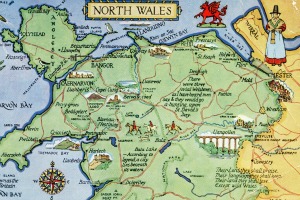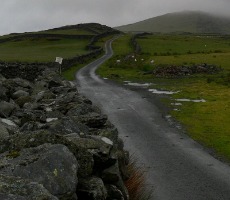The information age, when messages can be sent across the globe in seconds and packages from thousands of miles away arrive within days. This is the state that many believe Britain has already achieved, a near liquid society where movement of people, goods and information is as easy as a short walk or a click of a button. If this is the case, then why does even a simple task in north Wales seem like swimming through tar? And how will this impact the opportunities that come my way, asks 23-year-old Bryn Lewis, who lives in a small town between Llandudno and Bangor in north-west Wales.
In the area I live there is a problem with transport links. I can’t drive, and even if I could I doubt I could afford a car, let alone running it. Public transport is my only feasible option, and while there is a train station in my village, it’s only a request stop. This in effect leaves me with two main means of transportation – lifts and buses. Lifts are amazing, but even with my natural charm and fuel money more than a few in a week is pushing it. So basically buses as my first choice of transportation.

Now how effective are these buses? Better than walking I’ll admit, with the only city for about 70 miles being beyond walking distance. They do have their drawbacks though. Firstly, due to a quirk of geography, my village lies just outside the county borders of Gwynedd (a local government area), meaning I have to pay extra for full fares. Secondly, after six in the afternoon the buses become irregular, and non-existent after about 10.30 pm. In essence this stops me from acquiring work in public houses, restaurants and basically any place where the working day starts too early or ends too late. It’s a shame as this is the work normally given to the young and untested youth of the area.
If I want to travel within Wales but beyond north Wales it can be even harder. This is because the north and the south are split. A country divided, not by culture or language, but by bad transport links. To travel to the capital, Cardiff, takes longer than the much further trip to London. Train journeys skip out into England before coming back in near the south of Wales, and any soul who braves the journey through the central mountains and valleys can find themselves stuck behind slow-moving farm equipment on perilous and narrow roads, easily adding more hours onto the already long-winded journey. This travel time is not only an inconvenience; it fuels a split national identity. Admittedly only a small amount at the moment, but the longer the south remains inaccessible, the larger the effect will be.
But then surely in this brave new world of the internet physical connectivity is no longer the necessity it once was? Whether this is true or not, in the rural backwaters wireless internet can be impossible to acquire with hillsides blocking the signal. And where availability is abundant the connection speeds operate at snail’s pace. This may not mean much to the average person on the street, where sites can still be checked, and downloads just take longer, but its impact on businesses in the area is probably more profound.

In fact, my house, and indeed much of the area, sometimes loses connection altogether. In theory this is easily dealt with, and response teams are sent to fix the problem as soon as it’s brought to their attention. Unfortunately in an area where even the emergency services take time to arrive with the rough terrain and bad weather, this can become hours or days of down time.
On a social level this can be a hassle. I often don’t have phone credit and rely heavily on the internet to organise events. In lieu of internet, I’m left to wander into town, hope there are buses running and that my friends are about when I arrive.
On a professional level it is particularly problematic. Job searching, the admin for my youth work and my writing are primarily done on the Internet. Any period of downtime can be extremely awkward, time-consuming and costly.
Apparently this will soon change, with fibre optic broadband being rolled out along the coast. But in a world where technological advancements make the business market more and more competitive, with every passing year am I at a disadvantage trying to garner employment?
So how does all of this effect me and the people of this area? In most senses not much. I still manage most of my essential day-to-day tasks. A good quality of life can still be achieved and in some respects the slower pace is nice. However, over time, as the world hurtles into the future, this small gap will widen. It’s already a poor area and we cannot afford to let our infrastructure lag behind, making the area appear even less attractive to investors. More important still, we cannot allow ourselves to become further cut off from the world. In essence, connectivity is about bringing people together and this is where its impact will be felt most.
Bryn Lewis, 23, who lives in north Wales, is a youth worker with the Bangor Youth Group and is one of British Future’s Next Generation bloggers.






